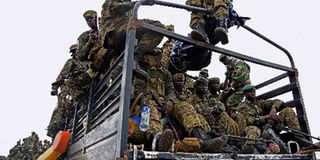Kenya in diplomatic spat with South Sudan spat over troops

Ugandan military personnel driving towards Juba, South Sudan, at the Nimule border point on July 14, 2016. Kenya may have kicked off a diplomatic storm with Juba after President Uhuru Kenyatta voiced his support for a reinforcement brigade in the country. PHOTO | AFP
What you need to know:
- President Kenyatta expressed the need for urgent reinforcement as well as the change of the mandate of the UN peacekeeping troops in South Sudan.
- On Monday, the AU agreed with the proposal, saying the troops are to come from Ethiopia, Rwanda, Sudan and Uganda.
- But South Sudan protested, calling Kenya’s stand “unfortunate.”
- The decision will be implemented if the UN Security Council endorses the African Union’s resolution.
Kenya may have kicked off a diplomatic storm with Juba after President Uhuru Kenyatta voiced his support for a reinforcement brigade in South Sudan.
The African Union (AU) on Monday asked Kenya and several other countries in the region to prepare troops for a new reinforcement mission to South Sudan in a controversial decision, even as Juba immediately rejected the proposal.
But the AU Summit's approval was only a rubber stamp to what regional leaders under the Intergovernmental Authority on Development (Igad) had decided.
On Sunday, President Kenyatta expressed the need for urgent reinforcement as well as a change of the mandate for the UN peacekeeping troops in South Sudan (UNMISS) as a response to the recent violence in Juba.
“It is our responsibility — all of us, but especially those in the region — to restore peace, and to restore it durably. Let me be clear: those of us in the region have a primary responsibility for peace and security here.
"But that responsibility is also collective — all of us must think carefully, and work hard, in the cause of peace,” he told reporters after meeting with UN Secretary-General Ban Ki-Moon.
“If I may be direct, that means that those outside the region ought to support our efforts to bring peace to South Sudan, and elsewhere.
“The UN Security Council would be well advised to vary the mandate of UNMISS so that it can separate those who have turned to violence, so that it can protect the infrastructure South Sudan has built, and so that it can enforce the peace. That is what collective responsibility means.
STANDBY FORCE
On Monday, the AU agreed with the proposal, saying the troops are to come from Ethiopia, Rwanda, Sudan and Uganda, countries that traditionally form the Eastern African Standby Force (EASF).
Currently, UNMISS troops are not allowed to enter combat. Their mandate is to protect encamped civilians and monitor violation of human rights but not to engage in street battles.
“Now is not the time for the theoretical debate that we have but how we can act quickly,” Algerian diplomat Smail Chergui, the AU commissioner for peace and security said.
“The UN does not have the mandate to impose peace. They are there when there is peace to keep. That is an added value with African troops in African countries. They are ready to engage in a very difficult situations often, even without the necessary facilities.”
(WATCH video here)
‘UNFORTUNATE’ STAND
But South Sudan protested, calling Kenya’s stand “unfortunate.” Martin Elia Lomuro, South Sudan’s minister of cabinet affairs, told news portal Sudan Tribune that the move would create a new problem for his country.
“That proposal will not work, because a problem is not solved by another problem and this thinking is unfortunate. [The] Kenyan government should have done better than this,” he told the news site.
Kenya is keen to see a stable South Sudan because it hosts some of the refugees from that country. In addition, about 7,000 Kenyans do business in South Sudan, and several Kenyan firms are working to establish operations in the country.
CHALLENGES
The decision will be implemented if the UN Security Council endorses the African Union’s resolution.
But there are challenges ahead.
First, this will be the second time in a year that the AU is pushing for troops to be deployed in a member state ostensibly to protect vital installations and civilians.
In December last year, the AU passed a similar resolution for Burundi following a spate of violence. But President Pierre Nkurunziza opposed the move and threatened to attack any soldier going there.
Then there is the financing part. The AU will rely on the UN to support logistical deployment. And though the AU passed a resolution to establish a Peace Fund on Monday, it is unclear whether it will be workable within a short time. Other AU missions such as Amisom (in Somalia) and the one to Mali are heavily financed by the European Union.
The UNMISS troops in South Sudan number 12,500, some of whom come from countries such as Kenya (1,163 troops), Rwanda (5,131) and Uganda (534).
But the UN Security Council will also have to extend its mandate beyond November this year if it were to alter the mandate.
Some African countries already contribute troops to UNMISS, but the African Union has previously opposed changing their mandate to reinforcement when it comes to implementing arrest warrants by the International Criminal Court (ICC), citing breach of impartiality.
South Sudan may raise the same objection if such a mandate is changed.





